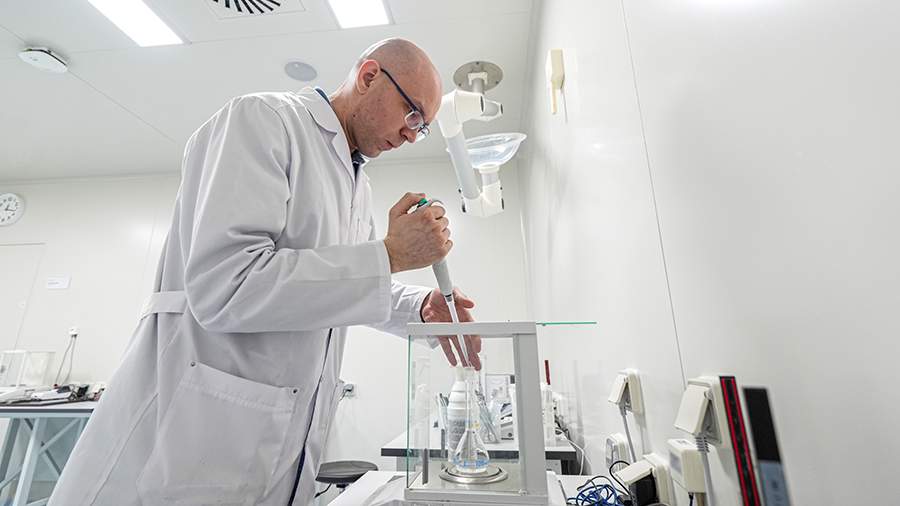How neural networks help to detect diseases and create medicines. Analysis

AI medical models communicate with patients, analyze X-rays and predict the risk of diseases, and the first drugs created using neural networks can go on sale in five years. How AI makes life easier for doctors and what prospects artificial intelligence has in pharmacology — in the material of Izvestia.
Drugs developed with the help of AI
• AI-based medicines and vaccines that are currently being developed are likely to be available within five to six years. For example, a psoriasis drug developed by the Japanese company Takeda Pharmaceutical Co has already entered the final stage of clinical trials, according to the results of which it can be approved for use.
• In the world of pharmacology, AI is most often used at the formula search stage. But Insilico Medicine, a Hong Kong company founded by Alexander Zhavoronkov, a graduate of Lomonosov Moscow State University, uses neural networks at every stage of drug development, from ideas to testing possible side effects on AI models, in order to obtain drugs ready for human testing. It is not yet known whose drug will be the first to be publicly available, but as the market shows, investors consider developments involving artificial intelligence to be a promising and profitable area, and therefore such startups are well funded.
• In 2024, only two AI-developed drugs were approved for clinical trials. One of them, a drug for the treatment of obsessive—compulsive disorder created by Exscientia and Sumitomo Dainippon Pharma pharmaceutical companies, failed to successfully pass the first phase of trials.
• Another approved drug was completely created using neural networks. This is a development of Insilico Medicine for the treatment of idiopathic pulmonary fibrosis, which received the working name INS018_055. The developers expected to receive the results of the second phase of testing, which was conducted in China, in 2024.
• In September 2024, Russian scientists announced the creation of a prototype drug for gluten intolerance using a neural network. Currently, there are no registered medicines for this disease in the world.
How AI is used in medicine now
Neural networks are already being used in radiology: images obtained as a result of radiography or computed tomography are processed using artificial intelligence. Modern technologies began to be introduced especially actively during the COVID-19 pandemic in 2021, when the burden on hospitals increased dramatically.
• AI helps to improve the quality of medical images, and when analyzing them, the neural network leaves hints to the doctor, highlighting the detected deviations in color, making measurements, and even composing text descriptions. Thanks to this, it is possible to carry out better and faster diagnostics in oncology and even predict the development of certain diseases.
• Specialists from the St. Petersburg Scientific Research Institute of Ear, Throat, Nose and Speech use neural networks to set up cochlear implants. This usually takes up to five days, and with the use of an AI system developed by the institute's specialists, the child will begin to hear almost immediately.
Promising areas include the use of AI for the treatment of rare cancers. AI-based systems can be taught to make molecular profiles that will allow predicting the development of a tumor. Computer vision is also useful in histology, as a neural network will significantly reduce the time required for routine tasks for pathologists.
• AI takes over the routine work of doctors. Chatbots answer the most frequent questions from patients, the neural network helps sort patients by priority and create work schedules for specialists, and voice chatbots reduce the time required to fill out medical records. Neural network assistants are available not only in Moscow, but also in other cities and regions of Russia.
The pros and cons of AI
It is impossible to name the exact number of pharmaceutical drugs that are currently being developed using neural networks, since this is a trade secret of pharmaceutical companies. But experts believe that all the latest vaccines, medicines, and proteins are created with the help of AI. This reduces the search time for the drug formula from decades to a few minutes.
• There is no risk yet in letting neural networks "float freely" in medicine. Due to the lack of data, artificial intelligence can "hallucinate", that is, produce information that is not based on facts. At the same time, in pharmacology, the risk of "hallucinations" of AI is minimal.
• Another danger that experts are talking about is rather ethical, since when making decisions jointly by a doctor and a neural network, it is difficult to determine who is responsible for the error. Scientists are currently developing benchmarks to determine how effective the results of AI models will be in the modern world.
During the preparation of the Izvestia material, we talked and took into account the opinions of:
- doctor, clinical pharmacologist, PhD, Children's Clinical Center named after L.M. Roshal Andrey Kondrakhin;
- Artur Kadurin, Head of the Deep Learning in Life Sciences Group at the AIRI Institute.
Переведено сервисом «Яндекс Переводчик»


